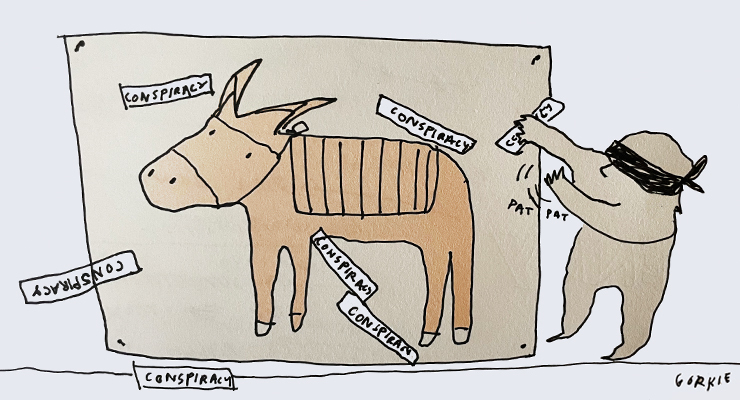
I’ve been a public intellectual and political activist for decades. In that time, I’ve watched with horrified fascination at the haphazard way the media alights on words and visuals to describe and illustrate important social and political phenomenon. Like the ubiquitous photo of an enormous baby bump to accompany every story on abortion, despite around 92% of terminations in Australia taking place within 14 weeks, when visible signs of pregnancy are scant.
In the traditional media age, academics and activists could shape coverage by distributing training manuals to mainstream media outlets or encouraging the Australian Press Council to develop specific reporting standards, as happened in regard to media coverage of suicide.
But today such interventions aren’t enough. Why? Because in the age of social media, we’re all broadcasters and distributors of news. Which means that we all have the power — and must accept the responsibility — to choose accurate and illuminating terms to describe the things that matter most.
Like the crumbling of liberal democracy in Western nations like the United States and Australia.
I’m not being a pedant. As Einstein reminds us, time spent making sure we’ve got our arms around a problem is never wasted. “If I had an hour to solve a problem, I’d spend 55 minutes thinking about the problem and five minutes thinking about solutions,” he once said.
Naming a problem accurately and in a way that flags the most important features ensures that the solutions we propose work.
Right now, we’re not doing this well when it comes to the feckless, fact-free, unilluminating, paranoid and anti-democratic drivel we find in our news feeds and on truth-relative TV and radio stations. The content the media has dubbed “conspiracy theories”.
This is a terrible name. Firstly, it’s too broad, capturing perfectly legitimate news in its ambit. Secondly, the word “theory” dignifies this rubbish beyond what its substance justifies. Finally (and most importantly), it’s a missed opportunity to point to what’s most incendiary and dangerous about this speech, which is not that it’s paranoid but that it’s a) unmoored from reality and b) designed to undermine our faith that truth and reality even exist.
I’ll take these in turn.
Too broad
A conspiracy theory is “an attempt to explain a significant political or social event as a secret plot by a secret alliance of powerful individuals or organisations”. As this definition makes clear, what became the Watergate scandal began life as a conspiracy theory, though it’s now just accepted historical fact. The theory about the murder of Jovenel Moise is another — still unfolding — conspiracy by powerful players that resulted in the assassination of the Haitian president.
My point is that powerful people sometimes do secretly conspire to do things that are wrong and dangerous for individuals and society. Theories about such conspiracies, where grounded in evidence, are not a problem for individuals and society, but a good and necessary thing to describe the real and complex forces that drive the changes we see in our lives.
Too dignifying
Much of the unproven or disproven assertions we call “conspiracy theories” are unworthy of the description “theories”. Academics Russell Muirhead and Nancy L Rosenblum call them “conspiracy without the theory”:
“…conspiracy without the theory dispenses with the burden of explanation. We see no insistent demand for proof, no exhaustive amassing of evidence, no dots revealed to form a pattern, no close examination of the operators plotting in the shadows. Instead, we get innuendo: some government agency “has an agenda.” Or it takes the form I’m just asking questions…”
Missed opportunity
The most regrettable aspect of the moniker “conspiracy theory” is that it misses the opportunity to point to the most egregious aspect of such speech. Which is not that it’s paranoid or intellectually lazy, but that it is untethered from reality and seeks to undermine faith that “reality” and “truth” are concepts that even exist, a state of affairs that, should it persist, will prove fatal for democracies. As my father, a regular listener of Fox News, informed me confidently the other day: “You have your facts, and I have mine.”
But while it’s easy to see what’s wrong with the phrase “conspiracy theory”, choosing a better description is less straightforward.
We need a description that is accurate, and points to the most problematic aspect of the speech, but that’s also punchy and pithy, so a hashtag and hopefully widespread adoption will follow. I’ve tried to fashion a few phrases to conclude this article, but none in my view are a clear winner. “Democracy destroying delusions”? “Anti-democratic lies”? “Paranoid nonsense”?
Which is why I’m reaching out to you, dear readers, for help. What word or phrase do you think best describes the speech we currently call “conspiracy theories”?
Below, to get you started, are a collection of words I’ve assembled that describe the nature or problematic aspects of the speech along three dimensions: the accuracy of the speech, the sincerity and intention of the speaker, and the impact of the speech.
Accuracy of the speech: Disinformation, propaganda, falsehoods, misinformation, unsubstantiated, unproven, disproven, lies, nonsense, garbage, drivel.
Sincerity and intention of the speaker: Bad-faith, delusional, self-serving, disingenuous, trust-undermining, anti-democratic, duping.
Impact of the speech: Trust-undermining, democracy-destroying, suspicion-sowing, confusion-sowing.
Feel free to add suggestions to any category or suggest a category I’ve left out, as well as sending me the word or word combination you think nails it. We’ll announce finalists and a winner in a subsequent column.
Can you help Dr Cannold come up with a better term than “conspiracy theory”? Let us know your thoughts by writing to letters@crikey.com.au. Please include your full name if you would like to be considered for publication. We reserve the right to edit for length and clarity.








I think you’ve missed the most significant factor of this type of discourse – it makes the believer feel good about themselves, it makes them feel superior to others, it makes them feel intelligent, it makes them feel like they know more than the ‘sheeple’ and it makes them feel connected to a community. It was interesting to hear Monica Smit address the whatever-they-are-about-now rally on the weekend. She told them something along the lines of how they had to have empathy for us sheep like mask wearers because wearing masks makes us feel part of something and makes us feel important. Which was an interesting observation, given that this is clearly the attraction of her putrid little organisation and beliefs.
Unless we acknowledge this important aspect of it, it’s very difficult to tackle the issue. These feel good factors have to be offered through other means, or the adherents of these beliefs will simply keep on believing.
Yes more often than not there is clear projection going on, they are actually describing themselves. After all, this is something they actually know, even if they lack the self-knowledge to see they are describing their own emotional needs and modes of thinking, not providing insights about others.
Everything Cannold says about the problems with the term ‘conspiracy theory’ is right. Her summary of the nature of these misnamed ‘conspiracy theories’ is good but should also note their entertaining and addictive qualities which help attract people to them and draw them in.
Finding one word, or even a short phrase, that can capture all the elements is really difficult. Perhaps it could be done with an acronym, along the lines of, for example, FUBAR.
Agree. Perhaps an acronym in the spirit of LGBTQ? In this instance AVCTGQSTW – Anti-Vaxxer/Conspiracy Theorist/God Botherer/QAnon/Sovereign Citizen/Tinfoil Hat/Whackjobs.
That should cover off the full spectrum of nutjobs
Yes, although I intended acronym in the sense of a pronounceable word made up of initial letters, rather than an initialism.
Agree in theory but it’s in line with LGBTQ. Unfortunately, too many Whackjob types need to be included.
You’re a bit behind the times. It should now read GLBTPPTTTINAUQNEC (Gay, Lesbian, Bisexual, Trisexual, Pentasexual, Pansexual, Transexual, Transgender, Transvestite, Intersexual, Non-binary, Asexual, Unsure and Queer Not Elsewhere Classified, generally with a couple of arithmetical operators tacked on at the end just to make sure no outlier feels overlooked).
So no, the last thing we need is yet another sesquipedalian bureaucratic acronym to drive yet more people into the arms of the Bolts and Credlins of this world.
Let’s just stick with generic Whackjob Theory then
I can’t stop wondering what’s wrong with queer for a catch-all.
How about “believable bullsh*t”?
The way I see it, all ‘conspiracy theories’ begin with a kernel of truth.
This kernel is of course then grotesquely twisted and amplified beyond recognition- but without a kernel or truth in there somewhere, nobody (not even fringe loonies), will accept and peddle it.
Take a look at any conspiracy theory that gains traction and you will find a tiny nugget of truth buried deep within.
For instance (from the greatest hits collection) JFK being shot by the CIA or Sept 11 being ‘an inside job’ where the US gvt blew up the twin towers with explosives.
Now we know of course that the US government and the CIA have a historical record of doing (or at least assisting in) clandestine political assassinations and acts of war abroad.
It’s not a giant mental leap to suggest they may not be limited by geography one day.
Or perhaps another classic-
Vaccines cause autism.
It’s true that vaccines, like all meds, have (and will continue to) cause injuries.
Further, it is also true that Big pharma giants like pfizer etc have historically been caught acting in grotesque, profit driven ways lobbying governments to approve meds that do little more than line shareholder pockets.
Again- it’s not a massive mental leap to suggest it’s one big ‘scam’ and we are the ‘guniea pigs’.
Of course the evidence (and lack thereof) prove it’s hogwash in all those instances- but our human brains are geared towards loving a good story above all else AND in spite of any logical evidentiary gaps.
Perhaps “plausible fairytale” could be another substitute term?
Our vivid imaginations love running wild; and the ‘believable bullsh*t’/’plausible fairytales’ that people confect give us what we crave.
Well this is on the money.
A very, very small kernel. The pizza shop debacle is a good example. There was no kernel. None at all, unless you count that children do get trafficked and sexually abused. But to tie it to those people and that place – nope. Van Badham’s recent book is very interesting in exploring the genesis of many modern CTs.
“Seditious untruth”?
This one!
Too Orwellesque when applied to stuff that isn’t actual sedition.
Maybe instead of ‘conspiracy theory’ (which might be true), we should use ‘conspiracism’ – a world view that attributes events in the world to conspiracies as a default assumption https://press.princeton.edu/books/hardcover/9780691188836/a-lot-of-people-are-saying
That’s not bad for the attitude. Those who take it up could be ‘conspiriphiliacs’, though that’s being rather kind.